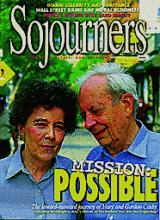Last year in Sarajevo, an Islamic theologian told me that only in understanding Victor Frankl's philosophy could one really understand the war in Bosnia - a people's struggle for meaning and a desperate defense of those symbols that give their lives meaning. Frankl, who died the same week as Princess Diana and Mother Teresa, founded the Third Viennese School of Psychotherapy (after Freud and Adler) known as Logotherapy, which he said "makes the human aware of the hidden logos or meaning of his or her existence."
While Frankl studied with Freud and Adler in the 1930s, his own work did not take on its real depth until the late 1940s after he spent three years in four Nazi concentration camps, including Dachau and Auschwitz. All of his family, with the exception of his sister who escaped, were killed in the camps. His enduring work of survival literature, Man's Search for Meaning, describes how he came to understand through his suffering that "everything can be taken away from a prisoner, except one thing: the last of the human freedoms, to choose one's attitude in any given set of circumstances, to choose one's own way."
Unlike other European existentialists, Frankl was neither a pessimist nor anti-religious. During his processing into the concentration camp his coat was taken from him and switched with another. He was devastated because his wife had sewn the manuscript of his first book, his life's work, into the lining. He found, however, that in the pocket of a stranger's coat was a torn piece of paper-printed on it was the Shema Yisrael, the most important Jewish prayer. He knew then that he would have to live his life's work through daily prayer.
Read the Full Article

